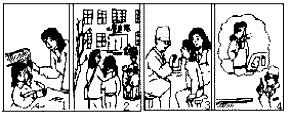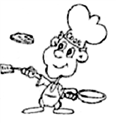| 完形填空。 | |||
| A professor (教授) told his students to go into the city slums (贫民窟) to study the life of 200 boys. He asked them to 1 reports about each boy's life and future. Every one of the students wrote, "He doesn't have any hope. " Twenty-five years 2 , another professor read about the earlier study. He told his students to 3 what had happened to the boys. They tried very hard and found that 176 of the boys had become successful 4 doctors, teachers and scientists. The professor was very 5 and decided to study further. Luckily, all the men were living near the place and was able to ask each one,"What made you 6 ?"Each one answered,'There was a teacher. " The teacher was 7 living there so the professor found her and asked the old woman 8 she had used to pull those boys 9 the slum, and change them into successful people. The teacher's 10 began to shine and said with a sweet smile. "It's really very easy.I loved those boys. " | |||
| ( )1. A. read ( )2. A. later ( )3. A. search ( )4. A. for ( )5. A. glad ( )6. A. wonderful ( )7. A. already ( )8. A. what ( )9. A. out ( )10. A. face |
B. study B. after B. find out B. With B. angry B. successful B. yet B. who B. into B. eyes |
C. write C. ago C. look for C. as C. surprised C. rich C. even C. which C. away C. hair |
D. take D. before D. see D. like D. worried D. popular D. still D. when D. out of D. mouth |
| 完形填空。 | ||||
| Two friends are having a picnic together. 1 names are Jack and Tim. Tim is very lazy (懒的). 2 the first evening of their holiday, Jack says to Tim, "Here's some money. Go and buy some meat." "I'm too tired," 3 Tim, "You go." So Jack goes to the market and pays $10 4 the meat. 5 he comes back, he says to Tim, "Here's the meat now, please cook it." But Tim answers, "No, I'm not good at 6 , you do it," So Jack cooks it, 7 he says to Tim, "Go and 8 some water." "No, I don't want to get my clothes dirty," Tim answers. 9 Jack says, "The meal is ready, come and eat it." "Yes, I'll do that," answers Tim, "I don't like 10 'No' all the time." | ||||
|
| 完型填空。 | ||||
| I found out one time that doing a favour for someone could get you into a lot of trouble. I was in the eighth grade at the time, 1 we were having a final test. 2 the test, the girl sitting next to me 3 something, but I didn't 4 . So I leaned over her way and found out that she was trying to ask me if I had an extra 5 . She showed me that hers was out of ink and would not write. I 6 to have an extra one, so I took it out of my pocket and put it on her desk. Later, after the test papers had been 7 , the teacher asked me to stay in the room when all the other students were 8 . As soon as we were alone, she began to talk to me about what it meant to 9 up; she mentioned how important it was to 10 on your own two feet and be responsible (有责任感的) for your own acts. For a long time, she talked about 11 and emphasized (强调) the fact that when people do something dishonest (不诚实), they are really 12 themselves. She made me promise that I would think seriously about all the things she had said, and then she told me I 13 leave. I walked out of the room 14 why she had chosen to talk to me about all those things. Later on, I found out that she thought I had 15 on the test. When she saw me lean over to talk to the girl next to me, it looked as though I was 16 something from the girl's test paper. I tried to explain about the pen, but all she could say was it seemed really 17 to her that I hadn't mentioned anything about the pen the day she talked to me right after the test. 18 I tried to explain that I was just doing the girl a 19 by letting her use my pen, I am sure she 20 to believe that I had cheated (作弊) on the test. | ||||
|
| 完形填空。 | |||
| I am ill and stay in a hospital. The days there are really 1 . I can't go out to play, and I have nobody to talk with, 2 my mother has to work in the day. We only talk on the phone. It is a 3 summer afternoon when I am 4 my mother's phone. A nurse comes in. She smiles (微笑) to me and asks, "Are you bored?" "Yes. It's too boring here." I 5 . She gives me another smile and says, "Don't be 6 . Here are some chocolate and magazines. I 7 they will help you. The she goes out. Her gifts (礼物) really 8 my life. I do not know her 9 . I do not meet her 10 that day, but I really want to say "thanks" to her. | |||
|
| 完形填空。 | |||
| Two men are walking in the park. One is Mr Brown, a worker, __1__ is Mr. Black. Mr. Brown is going to a __2__ . It is __3__ the road. Mr Black is __4__ him. Mr Brown finds Mr Black. Now Mr Br own begins to walk faster. Because he wants to __5__ the chair before Mr Black. Now Mr Black begins to walk faster because he__6__ wants to reach the chair first. Then they both run. Mr Black runs faster than Mr Brown. __7__ Bhe gets to the chair first and __8__ on it. Mr Brown runs after Mr Black. When he gets to the chair, he __9__ Mr Black sitting on it. He is sorry to show a notice (通知) with the words"Wet Paint (油漆未干)" to Mr Black. Now Mr Black knows __10__ Mr Brown is going to the chair. | |||
| ( ) 1. A. other ( ) 2. A. desk ( ) 3. A. next ( ) 4. A. before ( ) 5. A. get ( ) 6. A. also ( ) 7. A. So ( ) 8. A. stand ( ) 9. A. look ( ) 10. A.why |
B. others B. chair B. behind B. after B. arrive B. too B. Because B. sit B. looks at B. because |
C. the other C. car C. next to C. with C. get to C. either C. And C. sit down C. see C. what |
D. the others D. tree D. in the front of D. of D. reach to D. never D. But D. stand up D. sees D. where |

